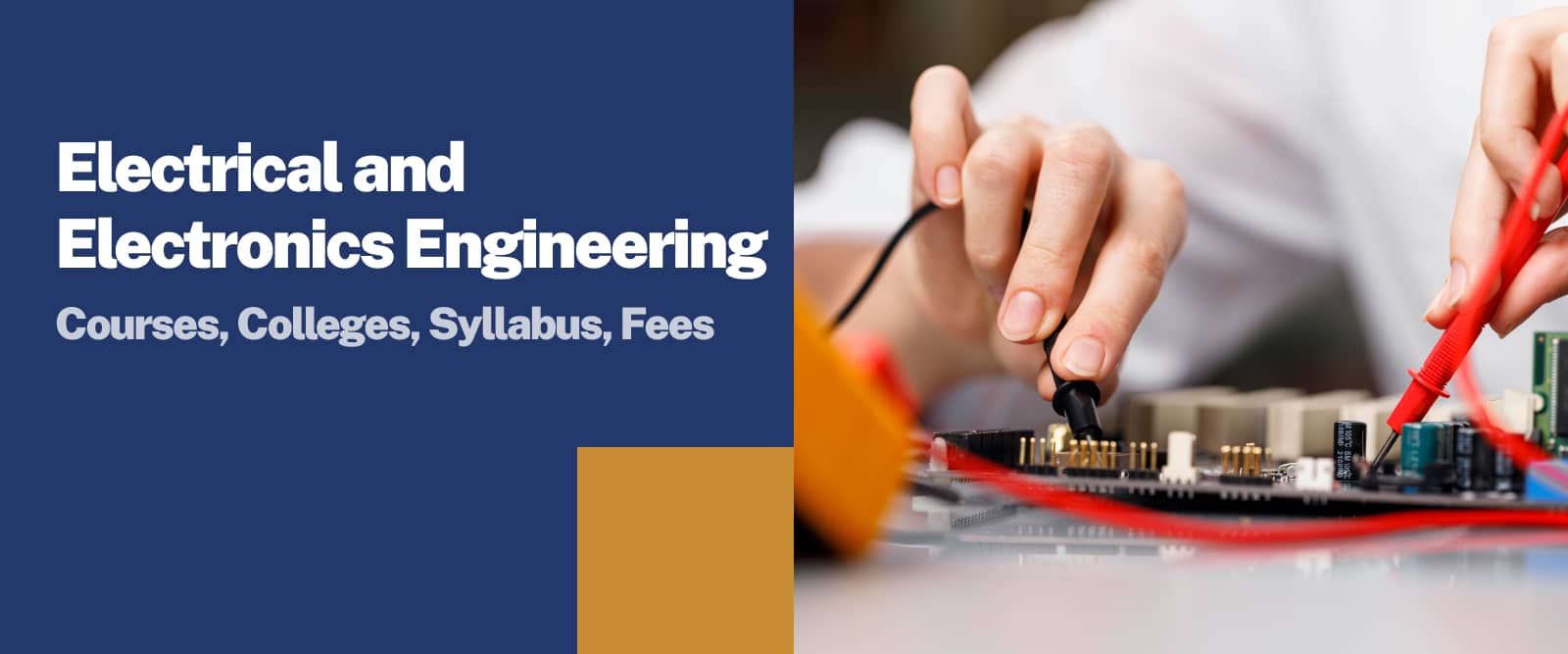5800 students unlocked their dream jobs with UG/PG programs in top colleges. Apply Now!
Electrical and Electronics Engineering is a branch of engineering that deals with the design, development, and maintenance of electrical systems, devices, and their components. It encompasses the study of electrical power generation, transmission and distribution, electrical machines, control systems, electrical circuits, communication systems, and electronics.
Electrical and Electronics Engineers work in a wide range of industries, including power generation and distribution, telecommunications, renewable energy, transportation, manufacturing, and medical equipment. Pursuing a B.Tech program in one of the top private engineering colleges in India can pretty much guarantee a lucrative career.
Electrical and Electronics Engineering has high demand both in India and abroad. In India, EEE graduates who pass out from a renowned B.Tech college can find job opportunities in industries such as power generation, transmission and distribution, renewable energy, manufacturing, consulting, defence, and telecommunications. Countries such as the United States, Canada, Germany, the United Kingdom, and Australia offer amazing job opportunities for EEE graduates.
[Also Read: Top engineering skills]
Eligibility to Pursue Electrical and Electronics Engineering
To pursue a B.Tech program in Electrical and Electronics Engineering, the general eligibility criteria are:
- Education: A student should have completed 10+2 or equivalent with Physics, Chemistry, and Mathematics as major subjects. Some universities also require a minimum aggregate score in these subjects.
- Entrance exams: Many colleges and universities conduct entrance exams to admit students into Electrical and Electronics Engineering courses.
- Age: There is no specific age limit to pursue Electrical and Electronics Engineering. However, some colleges may have an age limit for admission to their courses.
- Other requirements: Some colleges may have additional requirements such as a minimum score in qualifying exams, work experience, and performance in personal interviews or aptitude tests.
Admission Process for Electrical and Electronics Engineering
- Meeting eligibility criteria: Ensure that you meet the minimum eligibility criteria set by the college or university. Generally, the 10+2 scores with a minimum aggregate score in Physics, Chemistry, and Mathematics.
- Entrance exams: Pass the entrance exams for admission to Electrical and Electronics Engineering courses. The most commonly accepted exams in India are Joint Entrance Examination (JEE) Main and Advanced. Some colleges also accept other national or state-level exams.
- Application and registration: Fill out an online or offline application form and pay the required application fee. You'll need to submit the necessary documents, such as educational certificates, passport-sized photos, and identity proof.
- Counselling and seat allocation: Based on your performance in entrance exams, you'll be called for counselling, where you'll have to choose a college and branch of your choice. Seat allocation will be based on your score, availability of seats, and your preference.
- Document verification and admission: After seat allocation, you'll have to visit the college for document verification and to complete the admission process. You'll need to submit originals and photocopies of your certificates and other documents.
Electrical and Electronics Engineering Syllabus
Semester 1
- Applied Science
- Applied Mathematics
- Mechanical Engineering Science
- Elements of Electrical Engineering
- Applied Science Lab
- Basic Computer Skills Lab
- Electrical Wiring Lab
Semester 2
- Applied Mathematics II
- English Communication
- Electrical Circuits
- Electronics I
- Computer-Aided Engineering Drawing
- Electrical Circuit Laboratory
- Electronics I Lab
Semester 3
- Thermal & Hydraulic Machines
- Industrial Psychology/Industrial Sociology
- Basic System Analysis
- Electrical Measurements & Measuring Instruments
- Analogue & Digital Electronics
- Human Values & Professional Ethics
Semester 4
- Microprocessors
- Science-Based Open Elective/Mathematics III
- Network Analysis and Synthesis
- Electrical & Electronics Engineering Materials
- Electromechanical Energy Conversion I
Semester 5
- Engineering & Managerial Economics
- Fundamentals of E.M. Theory
- Electromechanical Energy Conversion II
- Control Systems
- Elements of Power System
- Analogue Integrated Electronics
Semester 6
- Industrial Management
- Elective I
- Elective II
- Power System Analysis
- Power Electronics
- Analogue & Digital Communication
- Human Value & Professional Ethics
Semester 7
- Open Elective I
- Departmental Elective III
- Department Elective IV
- Electrical Instrumentation & Process Control
- Human Values & Professional Ethics
- Switchgear & Protection
Semester 8
- Open Elective II
- Data Communication Networks
- Human Values & Professional Ethics
- Department Elective V
- Department Elective VI
The Best Electrical and Electronics Engineering Colleges in India
GD Goenka University, Gurgaon
GD Goenka University is a premier university offering India's comprehensive EEE B.Tech Program. The private university was founded in 2013 and had over 250 highly skilled staff.
Fees: ₹5,40,000
Admission: GATA
Duration: 4 years
Chaitanya (Deemed to be University), Warangal
Established in 1991, Chaitanya (Deemed to be University) offers a B.Tech program in Electrical and Electronics Engineering with Sunstone’s advantage — meaning better industry-oriented training and placement support.
Fees: ₹2,80,000
Admission: TS EAMCET
Duration: 4 years
Noida International University (NIU), Noida
Established in 2010, NIU is a popular B.Tech Electrical and Electronics Engineering college. The course comes with Sunstone advantage, where the student can experience industry-aligned training modules and impeccable placement support.
Fees: ₹4,44,000
Admission: Merit-based
Duration: 4 years
LPU, Jalandhar
Established in 2005, LPU is a private university offering excellent courses, including a comprehensive B.Tech Program in Electrical and Electronics Engineering.
Fees: ₹4,20,000
Admission: LPUNEST
Duration: 4 years
SAGE University, Bhopal
SAGE University offers the best-in-class facilities for students to secure their future. It was recently awarded the "Leading Private University of Central India" award. The university offers a B.Tech Electrical and Electronics Engineering program with the Sunstone advantage for better industry-led training and placement opportunities.
Fees: ₹3,20,000
Admission: SEE
Duration: 4 years
Jobs and Careers after Electrical and Electronics Engineering
Upon completing an Electrical and Electronics Engineering degree and garnering engineering skills, graduates can pursue a variety of careers in various industries, such as:
Power Generation: Engineers can work in thermal, hydro, and nuclear power plants, designing and managing the generation and distribution of electrical power.
Renewable Energy: Graduates can work in the field of renewable energy, including solar, wind, and geothermal power, designing and implementing renewable energy systems.
Manufacturing: Electrical and Electronics Engineers can work in the design and production of electronic products and components, including consumer electronics, telecommunications equipment, and industrial control systems.
Telecommunications: They can work in telecommunication companies, designing, developing, and maintaining communication networks, such as cellular networks and internet infrastructure.
Automation: Electrical and Electronics Engineers can work in the design and implementation of automation systems, including control systems for industrial processes and building management systems.
Research and Development: Graduates can work in research and development organisations, developing new technologies and products in the fields of electronics and electrical engineering.
Government Agencies: They can work in government agencies, including the Department of Energy, the Federal Aviation Administration, and the National Aeronautics and Space Administration (NASA), where they can apply their expertise in various projects and programs.
Electrical and Electronics Engineers is a vast field with several job roles like -
- Electrical and electronics engineer
- Lead power electronics engineer
- Electronics hardware engineer
Based on the seniority and experience of candidates, these roles may offer some additional responsibilities like senior engineer, project engineer, supervisor, lead engineer, etc. Electrical and Electronics Engineers draw an average salary of ₹3 lakhs per month.
Conclusion
We hope this article helped you learn about Electrical and Electronics Engineering and how it can open up avenues for excellent career growth. It offers immense scope and opportunities both in India and abroad. So, if you are interested in pursuing an electrical and electronic engineering degree, make a list of your preferred colleges and enquire about their admission process.
FAQ - Electrical and Electronics Engineering
Do I need any prior skill to pursue electrical and electronics engineering?
Candidates pursuing electrical and electronics engineering should have studied mathematics, physics and chemistry. A candidate must have sound knowledge in mathematical logics to understand the concepts of electrical and electronics engineering.
What does an electrical and electronics engineer do?
Electrical and Electronics Engineers work in a wide range of industries. They design and develop complex electrical systems in electronics products.
HELP
Take the first step towards your dream job.
ABOUT THE AUTHOR


